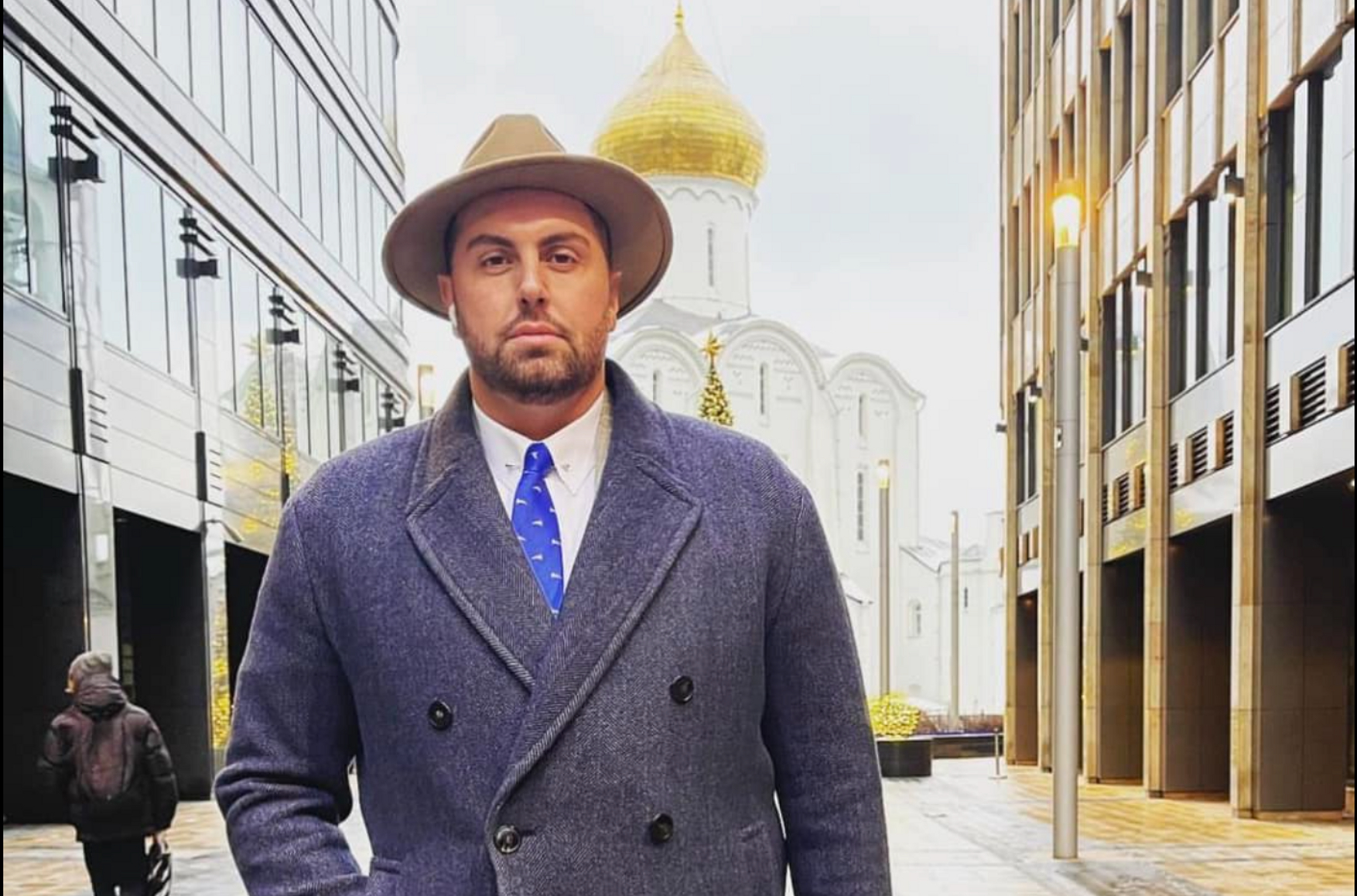

In April, four Americans affiliated with a Black empowerment and political organization were charged, along with three Russians, for conspiring to covertly sow discord in US society, spread Russian propaganda and interfere illegally in US elections. According to the prosecution, they were supervised by FSB officers and former Moscow Public Oversight Commission member Alexander Ionov. Starting in 2013, they were engaged in spreading pro-Kremlin disinformation and propaganda, as well as justifying Russian war crimes. In Russia, Ionov is better known as an informant, whose reports and denunciations have led to human rights activists and journalists being labeled “foreign agents.” In a twist of fate, Ionov himself has now been declared a “foreign agent” by the United States. The Insider took a closer look at Alexander Ionov, his connections to the FSB and private military companies (PMCs), as well as his attempts to influence US politics.
Content
Mercenaries in Syria
Defending Viktor Bout and Maria Butina
Kremlin money and a partnership with the military
Four recruited Americans
“Anti-Globalist” allies: APSP and Black Hammer
False information against Ukraine
Alexander Ionov became widely known in Russia in 2021, when his reports got independent Russian media outlets (including Meduza, The Bell, and Important Stories) labeled “foreign agents.” Ionov did not admit that he was acting on the initiative of the FSB – however, after his complaints, Russia’s Ministry of Justice sprang to life and immediately responded, adding the publications to its list of “foreign agents.” When the media learned of Ionov's existence, they began to study his biography, and discovered that he is always in close proximity of significant events – such as the war in Syria or elections in the US – aiding Russia’s secret services.
Mercenaries in Syria
The office of the so-called “Anti-Globalization Movement of Russia” is located in an old building of the Institute of Biochemistry and Mechanical Engineering in northern Moscow, built back in the 1990s. A portrait of Vladimir Putin adorns the entrance. Ionov's office itself, however, displays personal photographs of Bashar al-Assad and other Syrian officials, as well the flags of Syria, Venezuela, and Lebanese militant group Hezbollah.
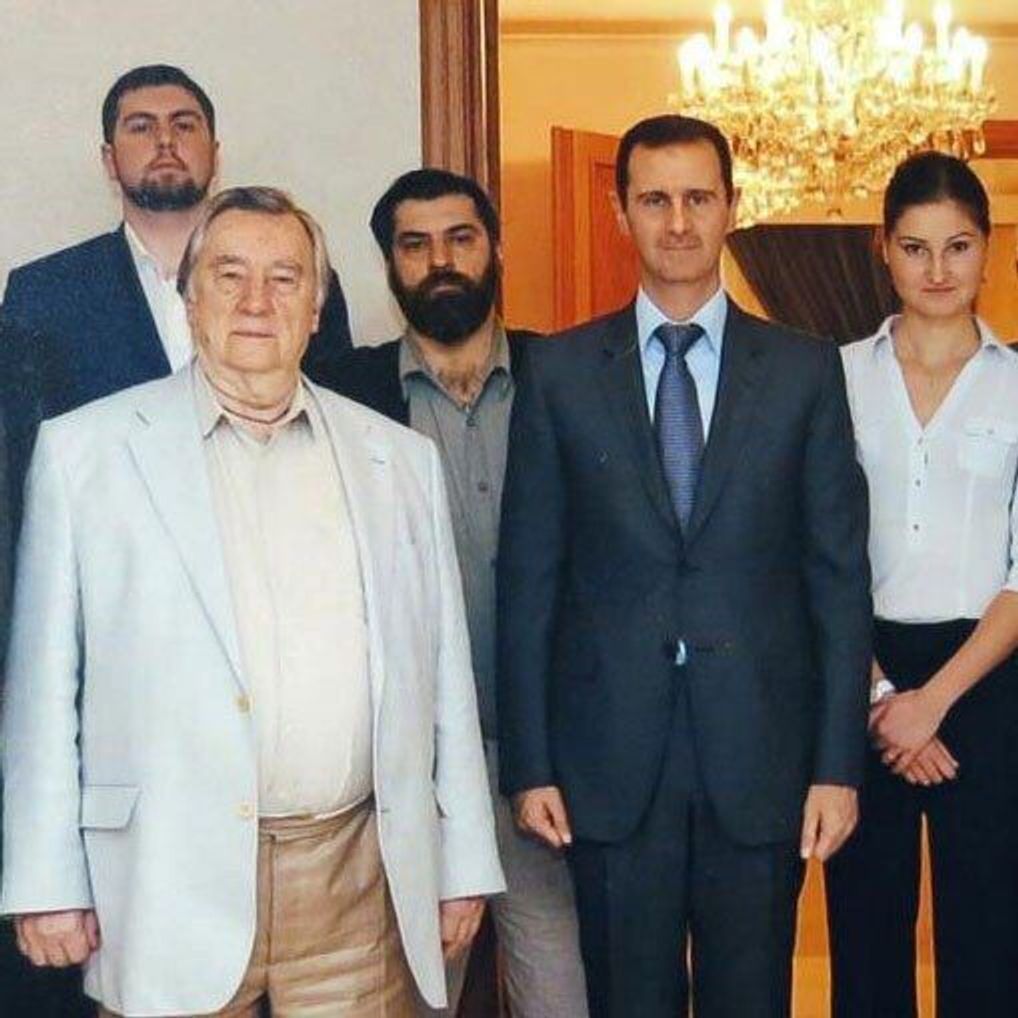
Ionov's first mentions in the media can be traced back to 2018, when Wagner PMC mercenaries came under fire from the US military, sustaining dozens of casualties. Ionov was one of the first to comment on the situation, and used the event to try to lobby for a law legalizing private military companies in Russia (PMCs are illegal in Russia, but the government has turned a blind eye towards mercenaries since the beginning of the war in Donbas in 2014).

onov claimed that he constantly traveled to Syria on business, where he would mediate between Russian and Syrian firms, although he did not specify what kind of goods they dealt in. He also claimed to have run his own private military companies. But his PMCs, unlike the Wagner PMCs, were not fighting on the front lines, but were engaged in commercial security.
Russian journalists later tried to uncover official traces of his business, but only found a shell company founded by Ionov – Mubashar LLC, registered in Damascus.
Defending Viktor Bout and Maria Butina
When the Russian government began its assault on Public Oversight Commissions (POCs) in the country's prisons and replaced real human rights activists with frontmen, Ionov again proved useful. He was included in the POCs in pretrial detention centers in Moscow, and began to position himself as a human rights activist. As Ionov himself later claimed, the story of the arrest of Viktor Bout, a major dealer in the international arms trade and drug trafficking associated with Russian military intelligence (GRU), pushed him towards the field of human rights.
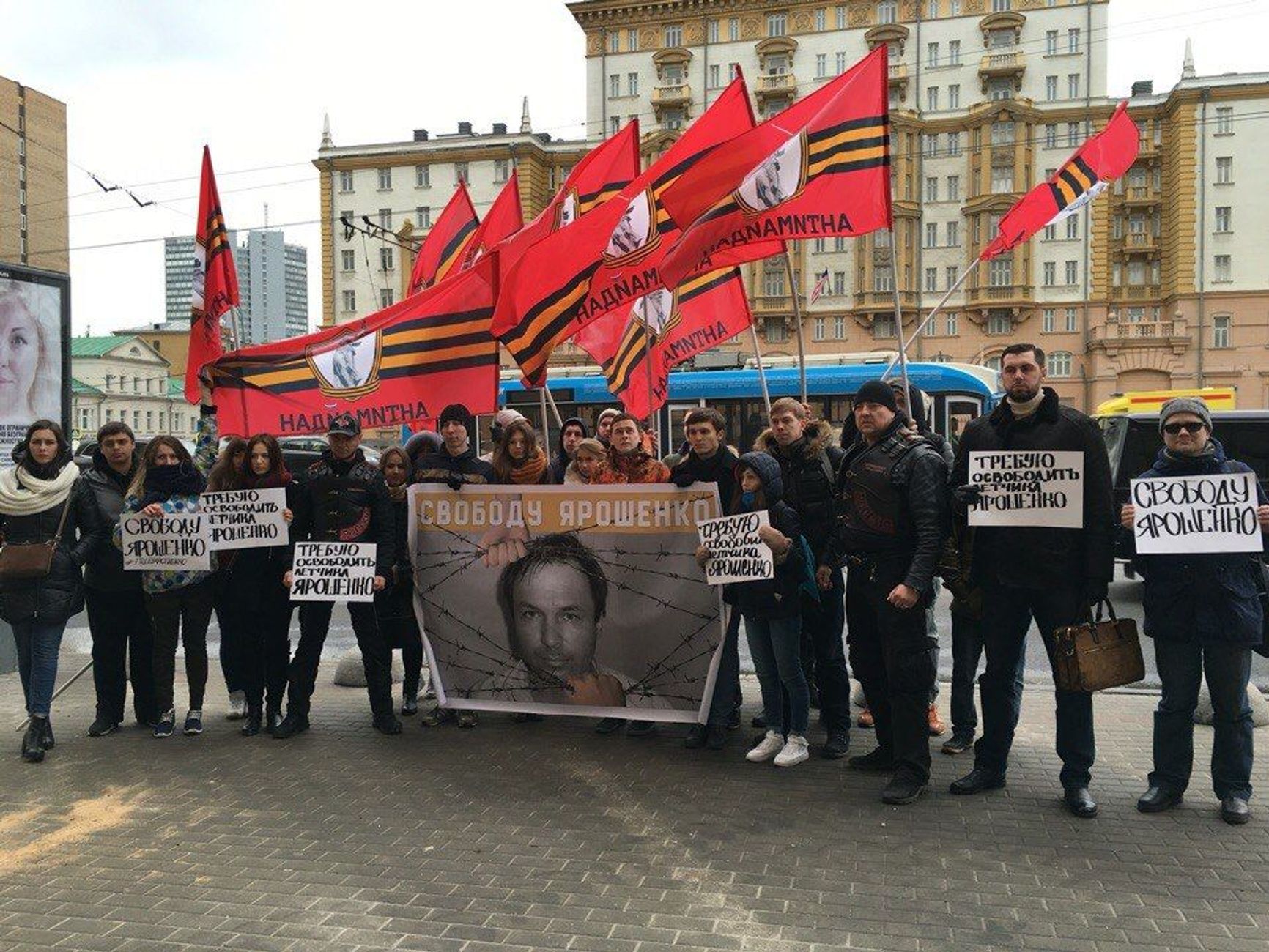
Ionov has repeatedly told journalists that the Russian government must do more to protect Bout, pilot Konstantin Yaroshenko (also accused of drug trafficking), and Maria Butina (an associate of Alexander Torshin, one of the leaders of the Taganskaya organized crime group and linked to the Russian secret services), who were arrested by the United States. For the latter he helped run a public campaign in her defense, collected money for her lawyers, and met her on her arrival at the airport. And then he even got her a job at RT. True, their friendship did not last long: Ionov signed a contract with her producer, under which Butina was to pay him a percentage of all paid interviews and even work royalties. Maria decided not to pay, and their friendship with Ionov ended there.
Kremlin money and a partnership with the military
Until 2010, Ionov had a completely different name – his name was Alexander Khvichovich Kashia. Ionov founded the organization “Anti-Globalization Movement of Russia” (“Antiglobalistskoye Dvizhenie Rossii,” or AGD) back in 2011, when he was a university student. But from street pickets and actions, the organization quickly switched to holding “international” conferences in Moscow's top hotels – the President Hotel and the Ritz-Carlton. Surprisingly, Ionov, a largely unknown figure, quickly began receiving presidential grants and government funding from the Kremlin. At the same time, various separatists from around the world began attending his events. For the most part, however, these were marginal individuals, no more famous in their countries than Ionov was in Russia. One of these figures was Nathan Smith, the leader of the Texas Nationalist Movement – an advocate of Texas breaking off from the United States – who attended Ionov’s 2016 “Dialogues of Nations” conference. In 2014, Ionov became a member of the Anti-Maidan movement and joined the leadership of Officers of Russia (“Ofitsery Rossii”).
His other place of work – the Institute for Security and Sustainable Development – is more worthy of attention. Ionov himself said that the organization specialized in the supply of special equipment and cybersecurity. In this case, the leadership of the institute consists entirely of former KGB officers and retired military, as openly described in their biographies on the organization’s website.
In 2021, Ionov switched to fighting independent media, and began regularly visiting the Russian Ministry of Justice with reports denouncing publications and journalists. He claimed that absolutely all Russian independent media outlets were guilty of “spreading Western ideas in Russia” and called for their recognition as “enemies of the people.”
Four recruited Americans
Ionov has been indicted in the United States for recruiting US citizens and interfering in a city election in Tampa, Florida. A jury also formally indicted two FSB officers and the US citizens they recruited.
The accused FSB officers included Yegor Popov (also known as “Yegor” or “Yegorka”), an FSB officer and Ionov's direct handler, as well as his superior, Alexei Sukhodolov, (aka “Borisych”, “AB,” or “X2”), the head of one of the units of the FSB’s Second Service, tasked with the “Defense of Constitutional Order” (the same division involved in the poisonings of Alexei Navalny and Vladimir Kara-Murza). Sukhodolov directly supervised both Popov and Ionov. Two other unnamed FSB officers are also mentioned in the case materials.
Ken Welch, the Mayor of St. Petersburg, Florida, expressed his concern:
“It is important to underscore that the City of St. Petersburg does not support, condone or tolerate any foreign government engaging in activities to undermine or influence our elections.”
“Today’s announcement paints a harrowing picture of Russian government actions and the lengths to which the FSB will go to interfere with our elections, sow discord in our nation and ultimately recruit U.S citizens to their efforts,” said Acting Assistant Director Kurt Ronnow of the FBI’s Counterintelligence Division. “All Americans should be deeply concerned by the tactics employed by the FSB and remain vigilant to any attempt to undermine our democracy. The FBI remains committed to confronting this egregious behavior and ultimately disrupting our adversaries and those who act on their behalf.”
According to court documents, since October 2013, Alexander Ionov (aka “Sasha”), under orders from the FSB, attempted to recruit representatives of various political groups in the United States to become agents of Russian influence. Those recruited were supposed to foment various conflicts and generally destabilize the political situation on US territory.

Alexander Ionov
According to prosecutors, Ionov managed to recruit Omali Yeshitela, the chairman of the African People's Socialist Party and the and the Uhuru Movement (collectively, the APSP), its members Penny Joanne Hess and Jesse Nevel, as well as August C. Romain, Jr. (aka Gazi Kodzo), a leader of the APSP and a founder of the Black Hammer movement in Georgia.
The APSP is a small organization openly advocating a revolution in the United States. The main points of its program are the payment of reparations to the black population in the US and “leading the struggle to end the system of domestic colonialism and smash the U.S. capitalist-colonialist state.”
For example, party chairman Omali Yeshitela claims to be fighting against American imperialism and demands that the term “African-American” be banned. Penny Joanne Hess has been a member of the radical party since its founding in 1976. Ms. Hess is white – a fact which doesn't stop her from touring the United States with speeches on white society parasitizing on the colonization of African peoples. When Jesse Nevel ran for mayor of St. Petersburg, Florida, in 2017, his campaign slogan was “Unity Through Reparations.” Their counterpart in the Black Hammer Party, Gazi Kodzo, also advocates for black separatism, conservatism, and political violence. In 2020, after the murder of George Floyd by police officer Derek Chauvin, Black Hammer evolved from a small group of activists to a relatively well-known movement.
Yeshitela, Hess and Nevel are also accused of acting as Russian agents in the US “without providing prior notification to the Attorney General.” If convicted, they could each face a maximum sentence of 10 years in prison.
There is also an accomplice in the case who has not yet been charged. The Insider was able to verify that the accomplice as Eritha “Akile” Cainion (real name Akilé Anai), director of agitation and propaganda for the APSP and editor-in-chief of the party’s newspaper, The Burning Spear. In 2017 and 2019, Cainion unsuccessfully ran for St. Petersburg City Council, and called for reparations for the area’s black residents in her campaign. During the 2017 election, Cainion led a march of over 200 people through the streets of St. Petersburg, demanding reparations for the black population.
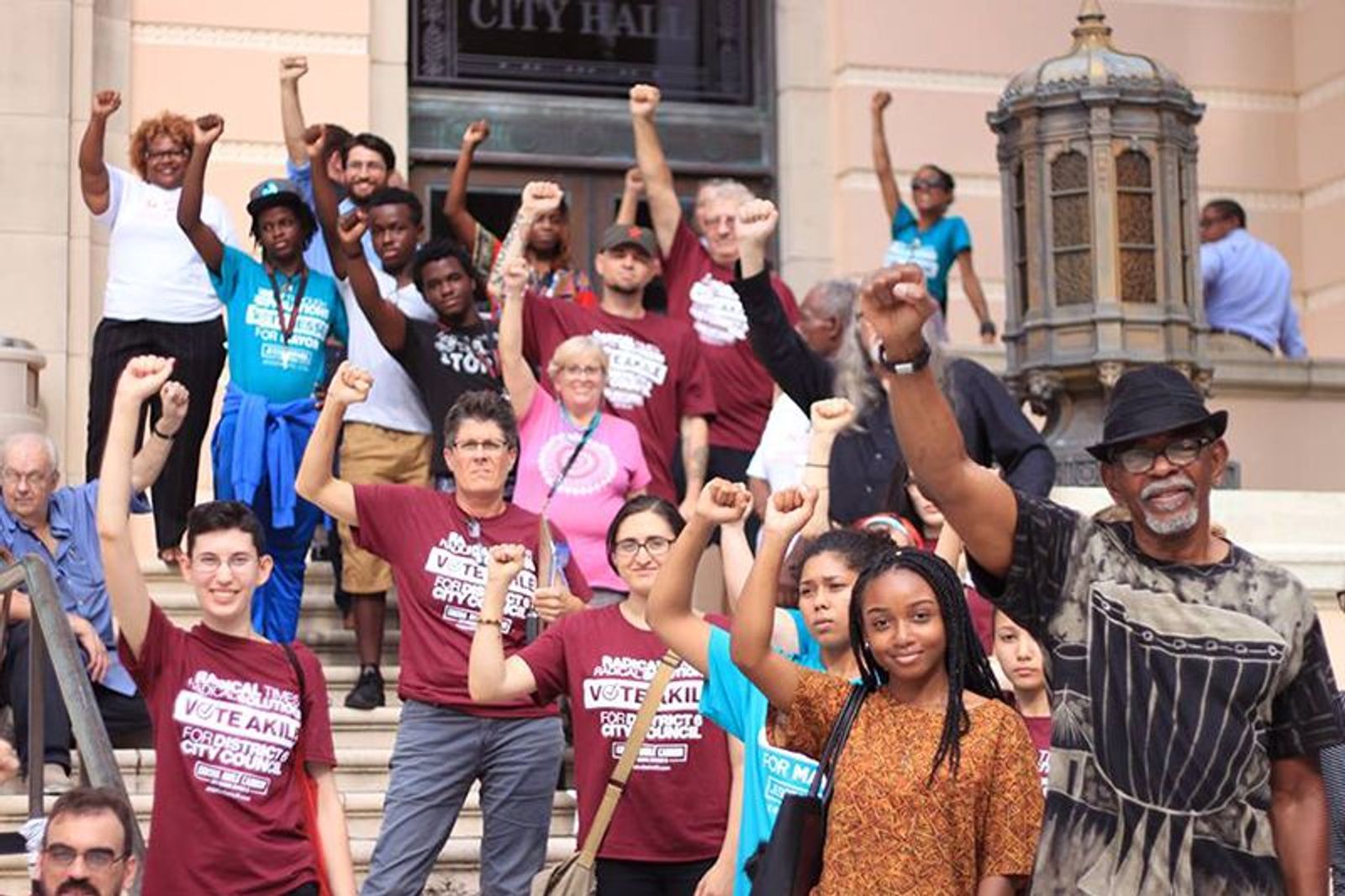
Omali Yeshitela and Eritha "Akile" Cainion during a St. Peresburg City Council election campaign in 2017
With only 7 percent of the vote, Cainion did not win a seat on the city council. However, she managed to secure an appointment as director of agitation and propaganda for the African People's Socialist Party, becoming the youngest member of the APSP National Central Committee.
“Anti-Globalist” allies: APSP and Black Hammer
The enlisted Yeshitela repeatedly flew to Ionov’s conferences, such as the aforementioned Kremlin-financed “Dialogues of Nations” in Moscow. All of the Americans' expenses in Moscow were covered by the “Anti-Globalization Movement.” In 2015 alone, Yeshitela flew to Russia twice – in May and September. After the second visit, all four – Hess, Nevel, Gazi, and Yeshitela – discussed that cooperating with Ionov was more than useful for their cause.
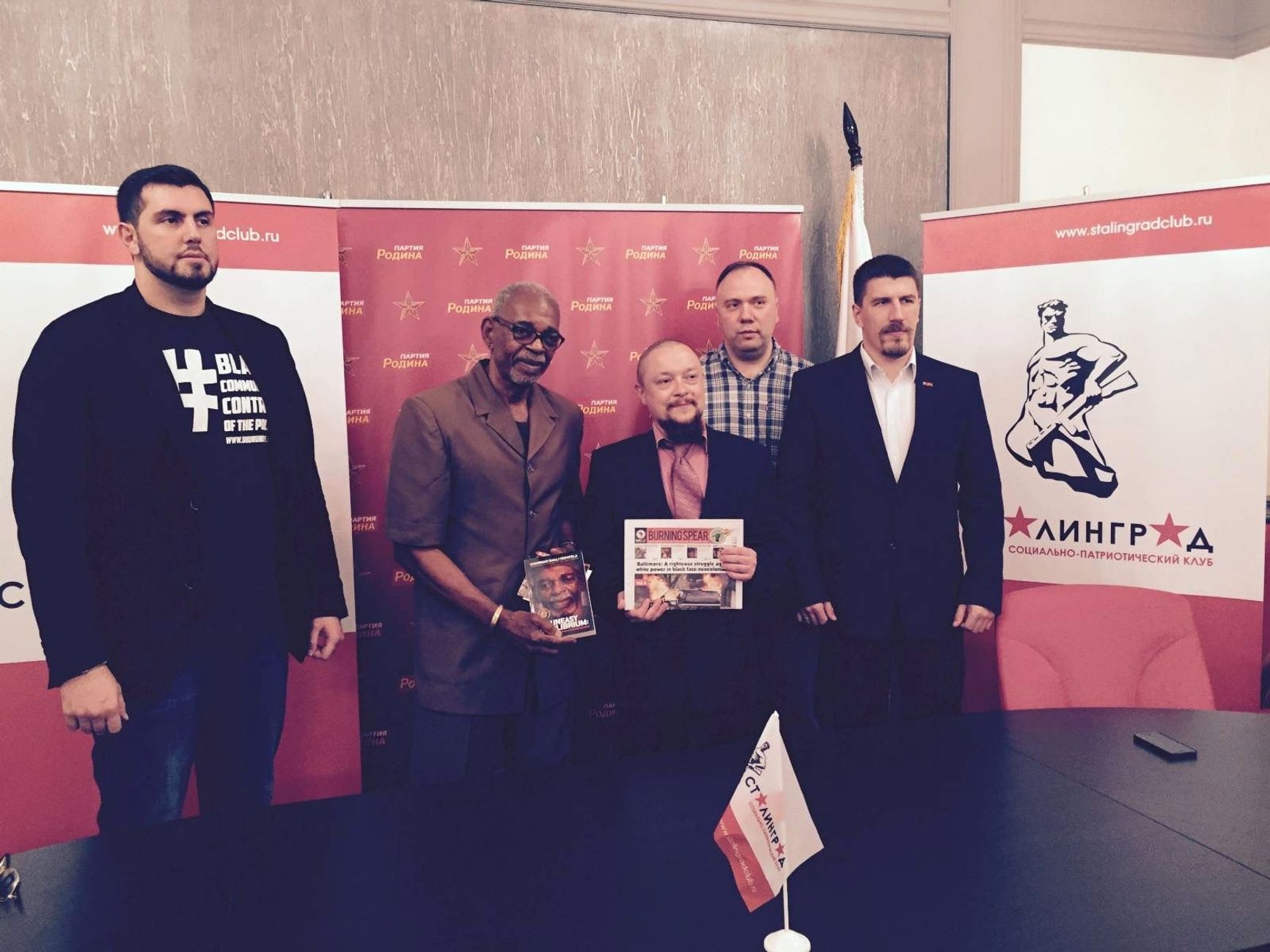
Alexander Ionor and Omali Yeshitela in Moscow, May 29, 2015
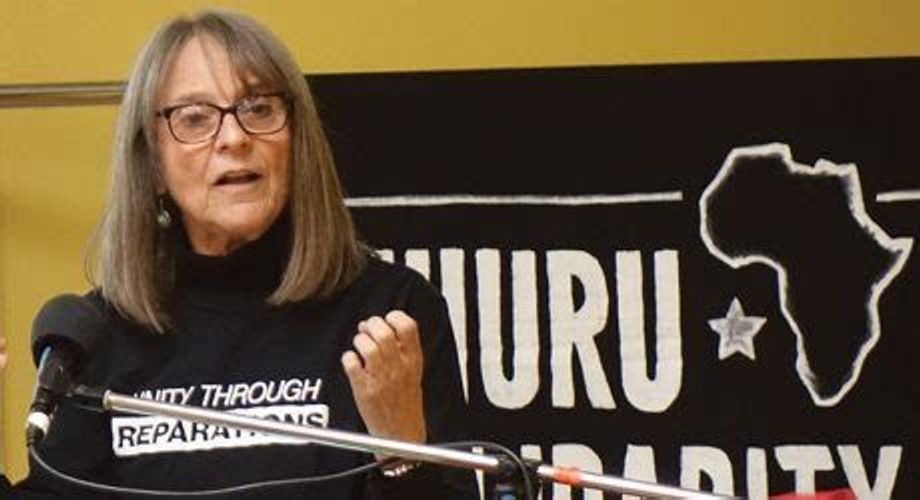
Penny Joanne Hess
In April 2020, Ionov invited Yeshitela to another “Dialogue of Nations” – this time in occupied Donetsk. At the end of the event, Ionov reported to FSB officer Yegor Popov, and in May, at Ionov's request, Yeshitela recorded a video in honor of the sixth anniversary of the so-called “DPR.”
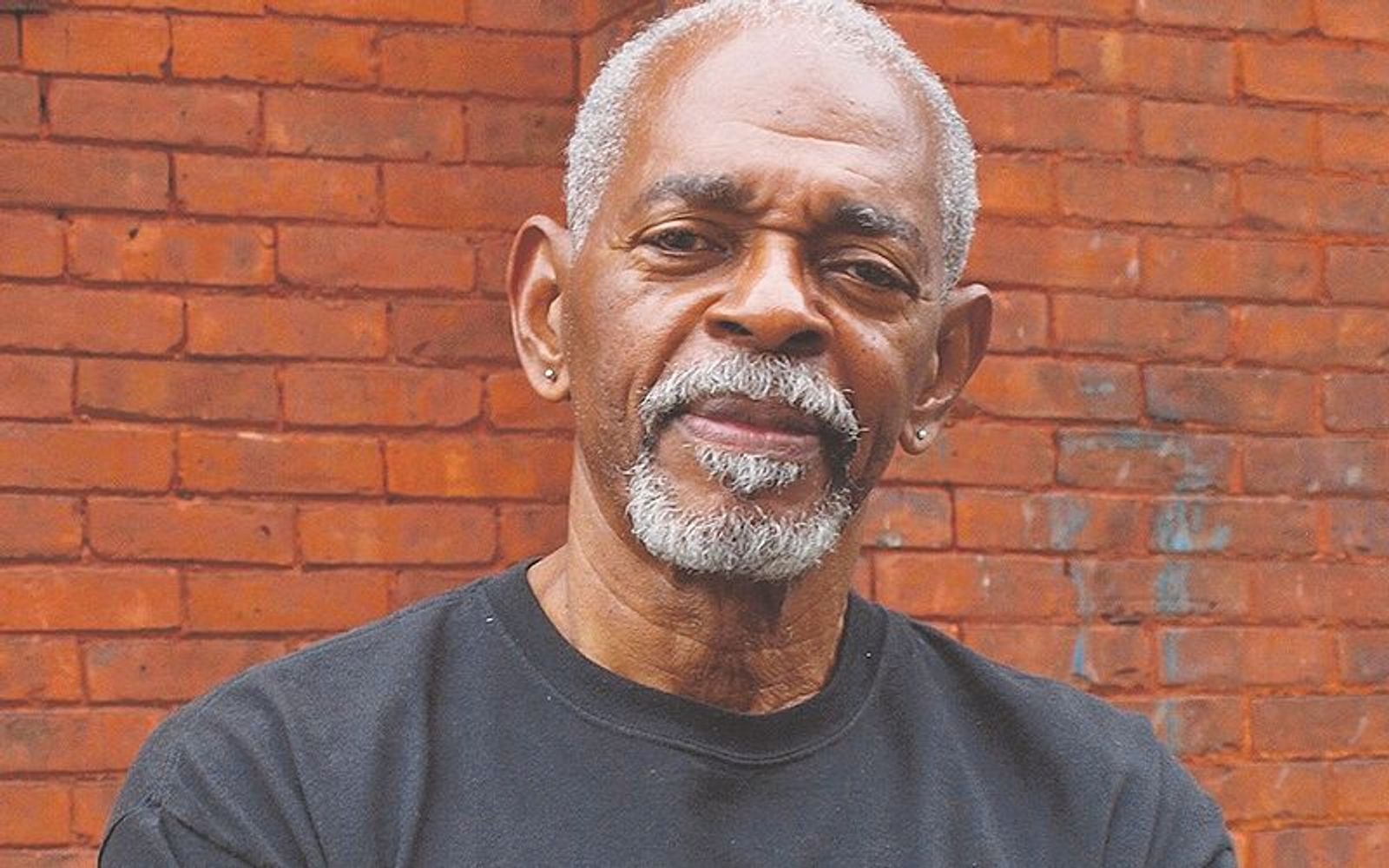
Omali Yeshitela
From Moscow, Ionov actively helped his US-based associates write petitions, work on propaganda materials distributed through their organizations, and organize rallies. Ionov regularly sent instructions to Yeshitela, Hess, Nevel, and Eritha “Akile” Cainion – on July 30, 2015, Ionov sent Hess a letter with the task of drafting a petition about the genocide of African people in the United States. Hess and Nevel responded that they needed money to do so, and immediately began work on the petition. The document was eventually sent to the UN General Assembly, the UN office in New York, and the official e-mail of the White House.

A 2015 edition of The Burning Spear – the official newspaper of the APSP
In the summer of 2016, Yeshitela and Hess were commissioned by Ionov to run a campaign condemning the US and EU for banning Russia from the 2016 Rio de Janeiro Summer Olympics. The Burning Spear – the official “organ” of the APSP – then published an article titled: “Imperialists ban Russia from the 2016 Olympic Games! APSP: Let Russia play!”
In early 2016, Ionov sent money to organize a march against the “colonial US government.” Two transactions of $3476.20 were recorded on February 4 and February 16. In July 2017, Nevel suggested in one of his letters that Ionov discuss funding his campaign for the mayoral election in St. Petersburg, Florida.
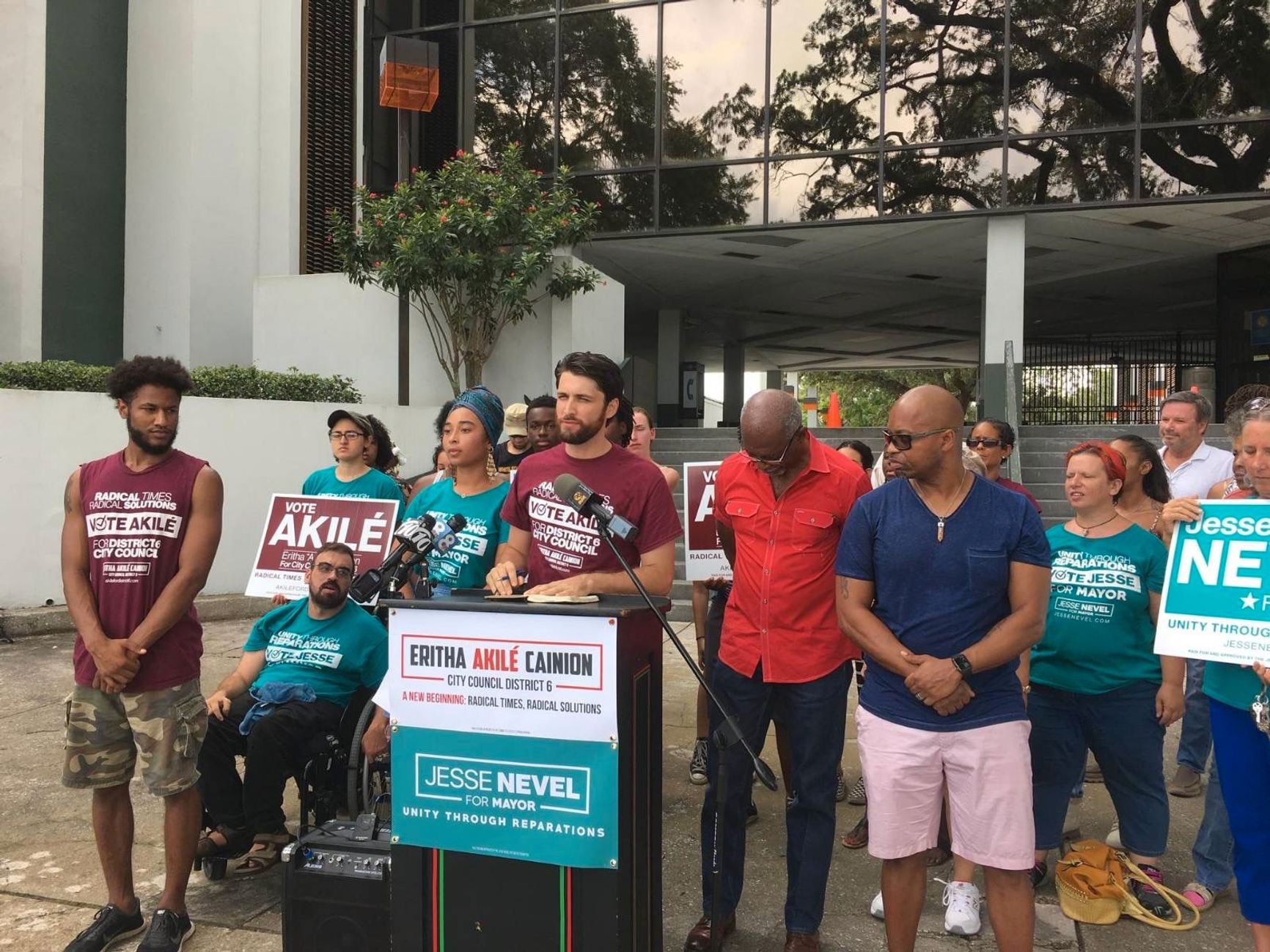
Jesse Nevel and Eritha "Akile" Cainion, 2017
Sometimes, though, Ionov asked only to display the flag of his own organization, the Anti-Globalization Movement of Russia, on the APSP headquarters in Florida. In February 2018, he sent these photos to his handler at the FSB, Yegor Popov, and the latter forwarded them to his boss, Alexei Sukhodolov. In 2019, Ionov and his associates tried to influence local elections in St. Petersburg. And in January 2020, on Popov's instructions, Ionov directed all his efforts on influencing the US presidential election..
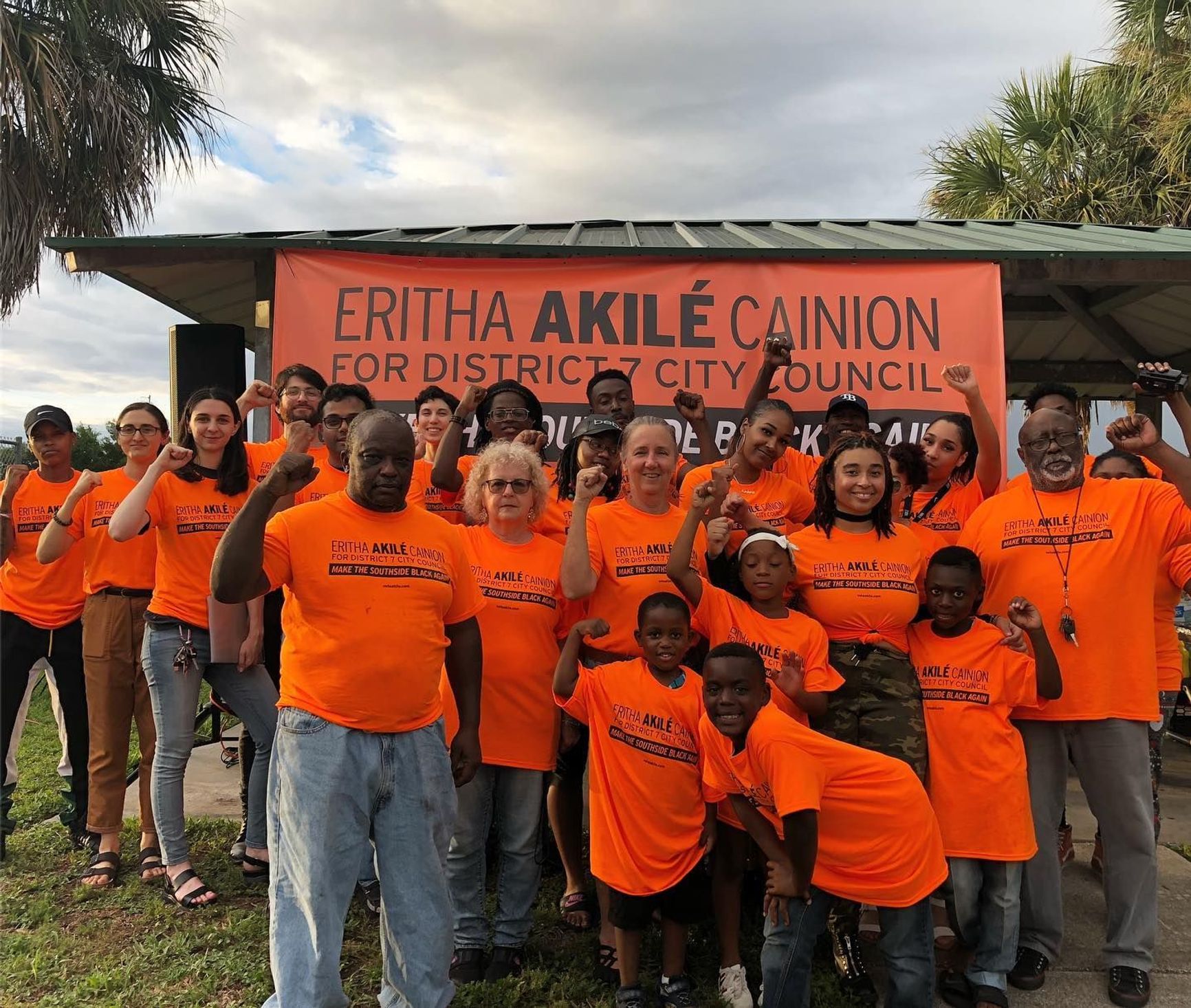
instagram.com/akilecainion

Facebook post by Alexander Ionov
facebook.com/alexander.ionov.54
Six months later, Ionov reported to Popov that the APSP and Black Hammer had held demonstrations in more than 40 cities. Hess called those actions a “success,” and Gazi even gave an interview to Russian propaganda outlet Ridus. More established media outlets failed to notice the American “revolutionaries.”
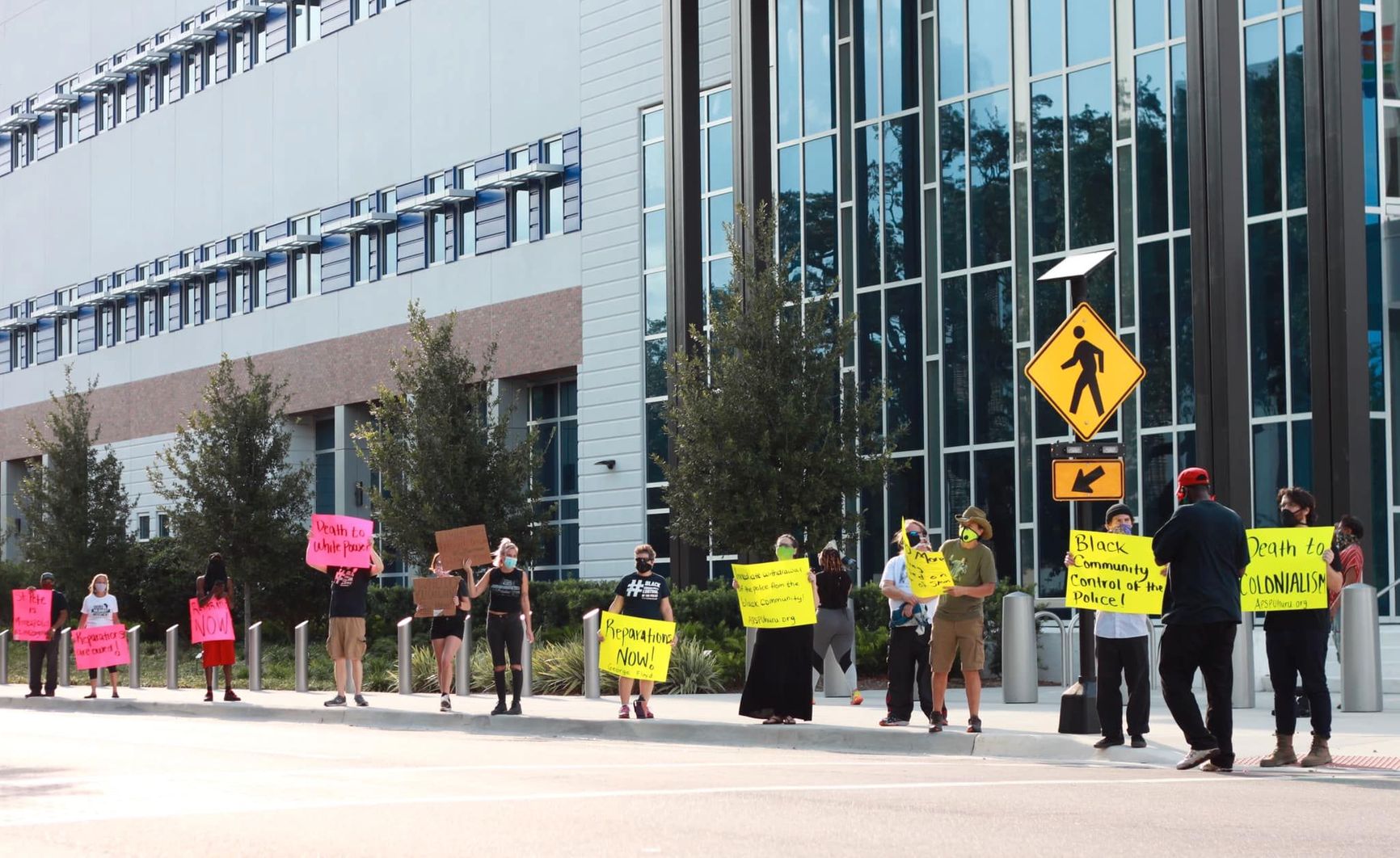
Ionov constantly reported to the FSB from the beginning of his cooperation with the APSP up until 2021.
False information against Ukraine
In 2021, cooperation between Ionov, the FSB, APSP and Black Hammer waned due to investigations by the US media. In 2022, however, work resumed after the full-scale Russian invasion of Ukraine: Ionov wrote a letter about the situation in Ukraine calling for increased efforts to support Russia. As early as March 17 – several weeks after Russian troops had invaded Ukraine – Yeshitela spoke at the APSP conference, saying: “The African People's Socialist Party calls for unity with Russia in its defensive struggle in Ukraine against colonial forces.”
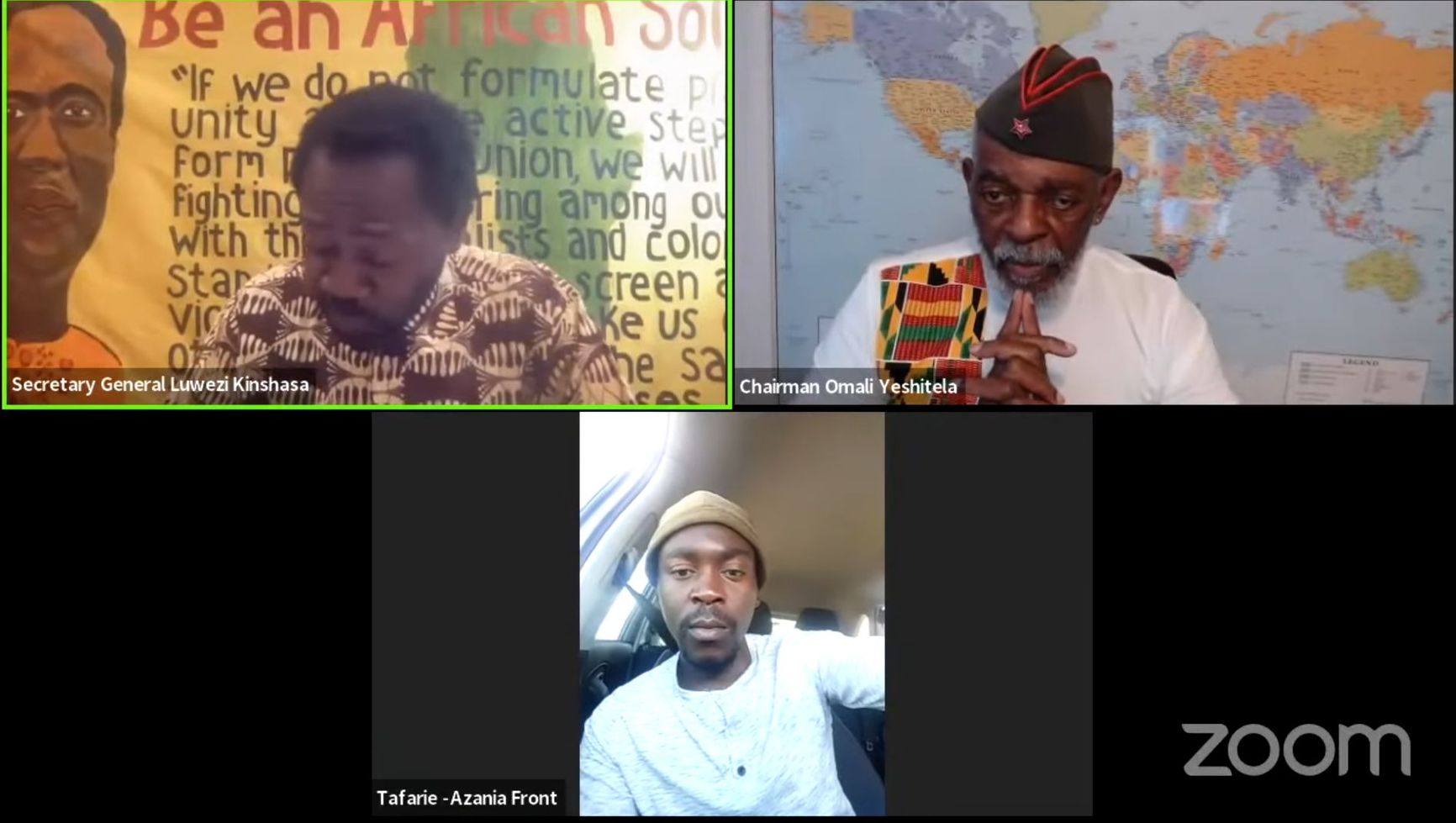
Zoom call dedicated to Ukraine
On March 19, Eritha “Akile” Cainion sent an unidentified recipient a letter with a presentation on “NATO and the Nazis in Ukraine,” compiled by Ionov and Yeshitela. Cainion signed her message with the following: «The APSP supports Russia! The APSP supports Putin!» That same day, Cainion sent a message to Ionov referring to a shared document, adding: “This is a link to the script we will be using. There are a few questions addressed to you personally, but you are free to make any corrections to the discussion at your discretion.”
On March 23, Gazi and several of his associates from Black Hammer held pickets outside the Meta Corporation with the Russian flag and posters that Ionov had sent them. According to court documents, Ionov paid them nearly $3,000 for airline tickets from Atlanta to San Francisco.

Picket outside the Meta corporation building, 2022

Facebook post by Alexander Ionov
facebook.com/alexander.ionov.54
In May, Gazi held a rally in honor of Victory Day, and Black Hammer published an appeal on its website titled: “Feed our people, not Ukkkraine” [the original spelling of the appeal has been preserved – The Insider].

Rally in honor of Victory day, May 9, 2022
adl.org/resources/backgrounder/black-hammer-organization
Beginning in June 2022, Black Hammer, under the control of Ionov’s AGD, spread disinformation about Russia's invasion of Ukraine. That same month, Gazi and Ionov created a plan to demonstrate outside the Georgia State Capitol. Ionov promised the organization coverage in an Irish media outlet and on a news website in Italy. In the video, Gazi declared that he is not ashamed to declare Black Hammer's friendship with the Kremlin.
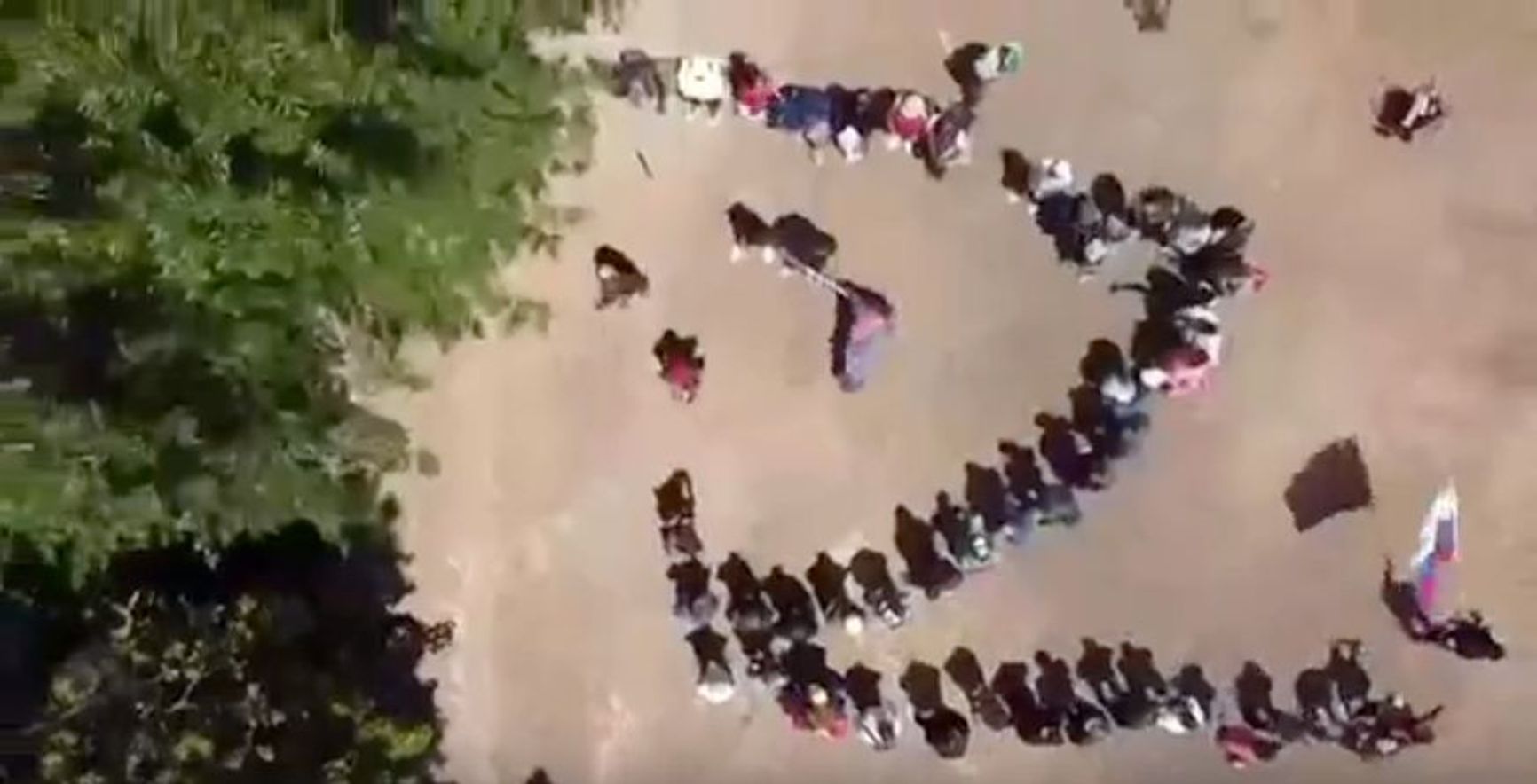
Black Hammer rally in Atlanta, Georgia. June 22, 2022
It is not known whether the accused were aware that they were financed by the Russian secret services, which required their activities for their reports. They likely could have connected the dots, but appear not to have paid much attention to the link between Ionov and the FSB. Following the storming of the Capitol on January 6, 2021, which included many small, odious activist groups, US law enforcement began to take right- and left-leaning political fringe groups more seriously, realizing that the Kremlin might try to use them to organize unrest in the 2024 election. In any case, Ionov’s actions led to serious legal trouble for both Russian journalists and American activists.
In a conversation with The Insider, Ionov denied any connection to the FSB and claimed that he was not familiar with the FSB officers in question.